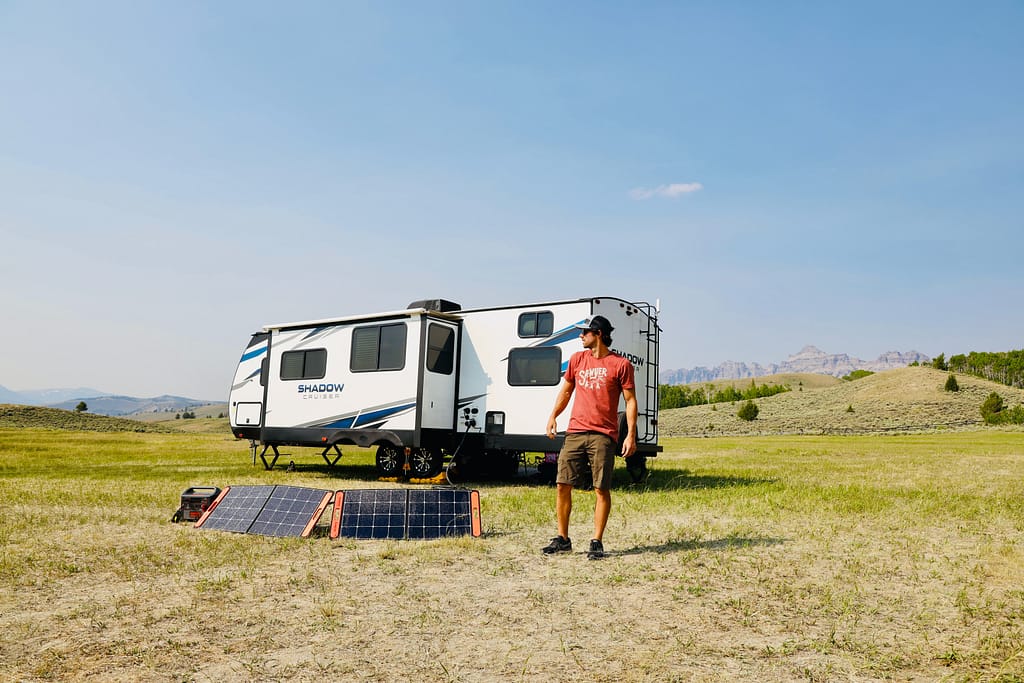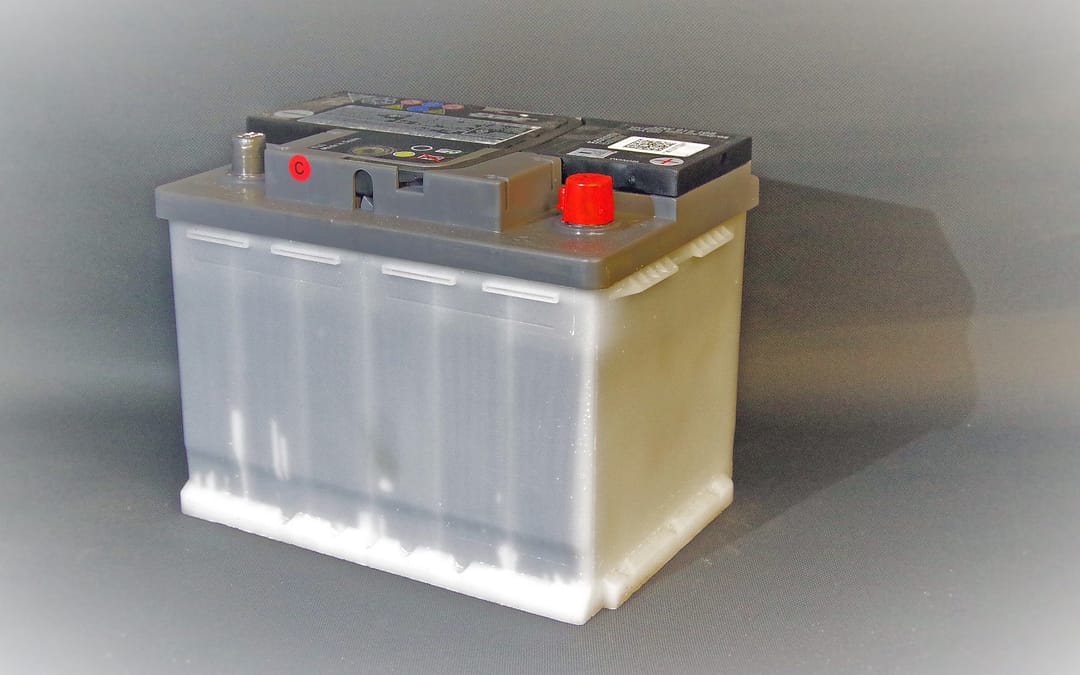This article may contain compensated links, please read our disclaimer for more information.
If you’ve never owned an RV before, learning the ins and outs of how all the systems work can seem a little bit overwhelming. There are holding tanks and water hookups to consider, and of course, there is the electrical system. And a big part of an RV electrical system? RV batteries.
That’s right, RV batteries are a crucial part of any rig. For this reason, it is important that you learn how to properly use and care for them. For instance, you always want to keep flooded cell batteries topped up with distilled water. It’s also good to know how to charge RV batteries and when to go about doing so.
In this article we will discuss everything you need to know about charging your RV batteries so you can make sure they are in tip-top shape as you wander and roam the country.
How to Charge RV Batteries while Camping
First, let’s discuss how you might charge your RV batteries while parked in a campsite and hooked up to electricity. This is the easiest time to charge your batteries, and for many full time RVers, it’s one of the only times charging really needs to happen.
You see, all you have to do to charge RV batteries while parked in a site with electrical hookups is plug the RV in. Your motorhome or trailer is equipped with a converter. This takes the AC power put out by the campsite power pedestal and converts it to DC power to be stored in your RV batteries.
The converter works to create DC power until the battery bank is full as long as you’re plugged in. This means your batteries should never die while plugged in at a campground, and if you only hop from one electric hookup to another without ever putting the rig in storage, you shouldn’t ever have to do anything special to charge your RV batteries.
It’s good to note that you do not have to be plugged in at a campsite to use your RV’s converter to charge your battery bank. A household 15- or 20-amp power outlet will do the job just fine. Just know that you won’t be able to run the whole RV off of this limited power source.
Should I Disconnect my RV Battery when Plugged In?
Since the RV batteries are automatically charged whenever the rig is plugged into power, many RVers are afraid of overcharging their battery bank. This leads them to ask, “Should I disconnect my RV battery when plugged in?” We can see where you’re coming from if you’re wondering the same thing. Luckily the answer is no, you do not need to take such measures.
RV converters can see when the battery is at full charge and will stop charging at that point. This automatically prevents overcharging, so you can safely leave your
RV batteries connected the entire time you’re plugged into power, even if you are a full time RVer.

Keeping Batteries Charged without Hookups
Planning to do some dry camping? Wondering how to keep RV batteries charged when no electrical outlet is available? Not to worry, there are plenty of other options.
Charging while Driving
First, it’s good to know that most RV batteries get some charge while in transit. In the case of a trailer, the electricity that is sent to the battery comes from the tow vehicle’s alternator. Meanwhile, motorhomes use the chassis alternator to produce electricity to charge the house battery.
In the vast majority of cases, all of this charging happens just fine without any modifications. However, if you choose to replace your RV batteries with lithium batteries, you might have to look into upgrading your charging system with a DC to DC charger.
You see, lithium batteries require a bit more power than traditional lead acid batteries, and because you can’t limit what they pull from the vehicle, it’s not unheard of for them to cause damage to alternators. A DC to DC charger ensures that only a safe amount of power is pulled from the alternator to the battery bank, so your house batteries are being charged without any vehicle issues down the line.
Generator
A generator allows you to charge your RV batteries no matter where you are. It is the quick and easy solution when you’re wondering how to charge RV batteries in the middle of the wilderness or even in a Walmart parking lot.
Many motorhomes come equipped with onboard generators. As long as you maintain this generator well, it will likely last you for many years and is a great solution for how to charge RV batteries.
If your rig did not come with an onboard generator, a portable generator should be purchased. An inverter generator is your best bet for the safest and quietest experience possible. If you just want to charge batteries and run basic things, a 2,000-watt generator will be just fine. Hope to run the AC and microwave? You probably want to look into a 3,500-watt portable inverter generator instead.
Solar Panels
Not into the noise and smell a generator makes? Hoping for something that doesn’t require fuel? In this case, installing solar panels and a charge controller on your RV might be the best answer to how to charge RV batteries for you.
If you plan to boondock often, a solar charging system is a game changer that in some cases can allow you to stay out in the wilderness indefinitely. Unfortunately, installing solar can also feel pretty overwhelming.
If you aren’t sure how to go about it, a simple solar generator might be a good place to start. We also really like the Renogy solar panel kits, which are pretty much plug-and-play, making them easy to install even if you don’t know much about solar panels or electricity in general.
How Long will the RV Battery Last while Boondocking?
Many people wonder, “How long will an RV battery last boondocking?” Unfortunately, we can’t give a one-size-fits-all answer to this question. How long your battery lasts depends on what type of battery you have and what appliances you run while boondocking.
If your battery bank is decent and fully charged and you are willing to limit how much electricity you use, you may be able to boondock for a few nights without recharging. However, most people who boondock often and for more than a night or two find that they really do need to figure out how to charge RV batteries without hookups. A generator, solar panels, or some combination of the two will allow you to dry camp comfortably.
Charging RV Batteries During Storage
We can’t write an article about how to charge RV batteries without mentioning RV battery storage. If you’re RVing full time, this may not ever apply to you. However, many full timers do find themselves storing their rigs from time-to-time, so this is good info to have.
You see, even while the RV is not in use, the RV batteries are still slowly drained. You can slow this process by disconnecting clocks, radios, alarms, and anything else that might be drawing small amounts of power, but even then the batteries will die eventually. This is a problem because most batteries are not made to be fully discharged and can be damaged if they are run down to zero. On top of that, while a charged battery cannot freeze, an empty battery absolutely can do so, and freezing will also cause damage.
For this reason, and because you probably don’t want to come back to a totally dead RV battery, it is important that you take measures to keep your RV batteries charged while the rig is in storage.
- If you’ll only be storing for a week or so, simply disconnecting the battery should be enough to do the trick.
- If the RV will be in storage for months, you might want to make a point of returning to the rig weekly in order to either A) recharge the batteries or B) remove the batteries entirely and use a trickle charger to keep them topped up until you return to your home-on-wheels.
As you can see, there is a lot to know about how to charge RV batteries. That said, for the most part, you shouldn’t have to think too much about keeping your RV batteries charged unless you will be boondocking or storing the rig. Additionally, once you learn what works for you and your batteries, it’s really an easy thing to stay on top of.
Join Fulltime Families
Fulltime Families Members get access to the best resources, community and discounts.
Fulltime Families is a participant in the Amazon Services LLC Associates Program, an affiliate advertising program designed to provide a means for sites to earn advertising fees by advertising and linking to amazon.com, amazon.co.uk, amazon.ca. Amazon and the Amazon logo are trademarks of Amazon.com, Inc. or its affiliates.

